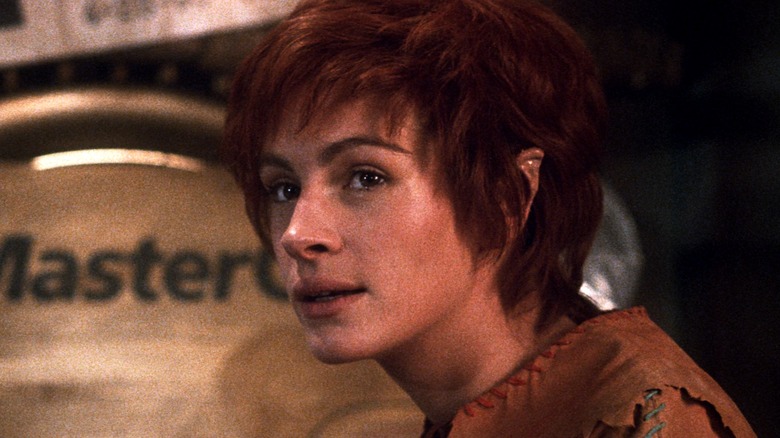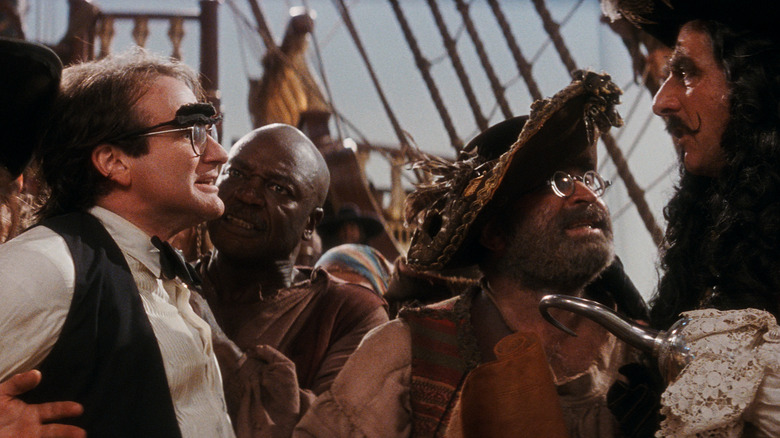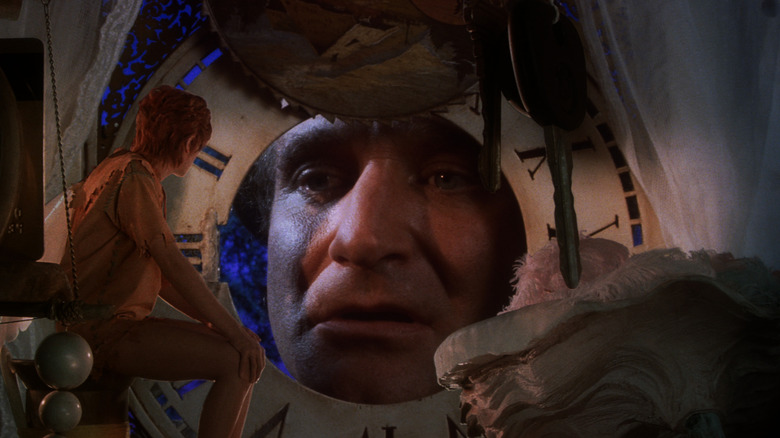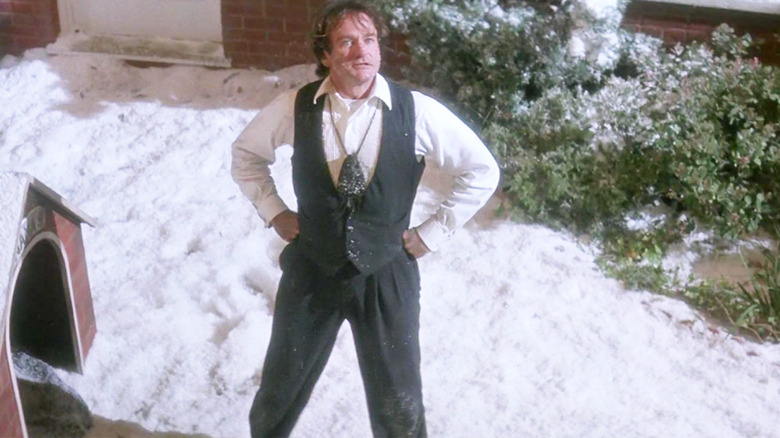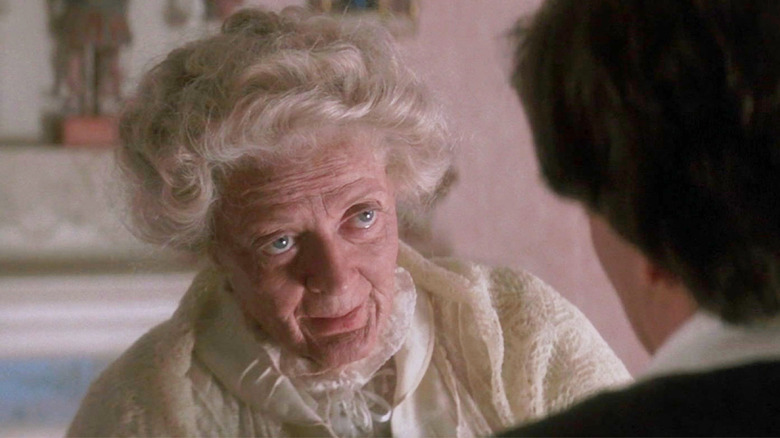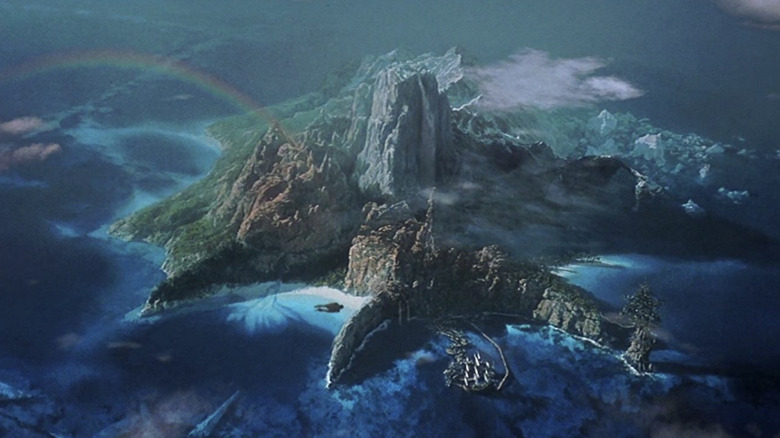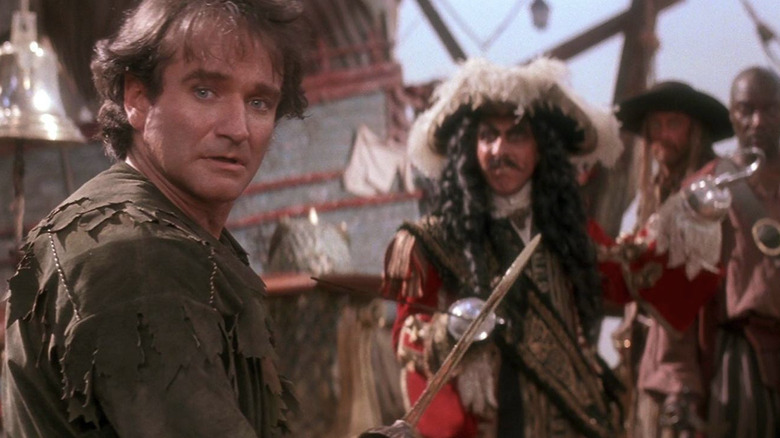The Most Underrated Steven Spielberg Movie Is Way Better Than You Remember
The name Steven Spielberg is synonymous with cinema. The man has given us velociraptors in kitchens, soldiers storming the beaches of Normandy, and a kid flying over the moon. All of these moments will be stapled in film history textbooks as stunning demonstrations of a master at his craft.
However, when a director earns such a gigantic reputation for greatness, the occasional hurdles he encounters on the way become barely registered blips on the radar – cinematic slip-ups worth forgetting. "Preposterous," some may cry. "Unfathomable," others might declare, at the idea that the director responsible for classics like "Jaws," and "E.T.: The Extra-Terrestrial," could deliver a flop — and in his prime, no less. But in the eyes of critics, he did just that, and this flop now sits as Spielberg's lowest critically reviewed film on Rotten Tomatoes. That very film — a childhood fairy tale that collides with the harshness of adulthood — was sandwiched between "Indiana Jones and the Last Crusade" and "Jurassic Park" in the blockbuster timeline, and is usually regarded today as Spielberg's biggest misstep.
It's not. Forget all the tired criticisms you've heard in the past, because "Hook" is mistreated cinematic magnificence, and perhaps even one of the master's most masterful inventions. In fact, we'd say the best scientific term for this film is (what else?) bangerang, and we're going to tell you why.
Hook is the forgotten treasure Spielberg still doesn't dig
"Hook," Steven Spielberg's sequel to Peter Pan, clocks in on Rotten Tomatoes at 29% critically, making it the lowest-ranked film in Spielberg's filmography. How could this be the case? In theory, the idea of Robin Williams regaining his mantle as leader of the Lost Boys, and returning to face Captain Hook (Dustin Hoffman) isn't just a great idea — it's a perfect story to be handled by the director who pretty much wrote the book on family blockbusters.
While an entire generation of kids grew up loving this film, though, the man behind it all still believes that his trip to Neverland just didn't work. Speaking on the Kermode and Mayo Film Review (via YouTube), the director admitted, "I still don't like that movie. I'm hoping someday I'll see it again and perhaps like some of it." Spielberg's harsh words on his own work continued in Empire Magazine that same year, when he said, "I didn't have confidence in the script. I had confidence in the first act, and I had confidence in the epilogue. I didn't have confidence in the body of it."
It's here that we say, with all respect (and in the nicest possible way) — bad form, Mr. Spielberg, sir. Actually, "Hook" absolutely slaps for a host of reasons, but more than anything else, it's a heartfelt comeback story propelled to the clouds by a stellar cast.
Robin Williams' Peter Pan anchors a truly amazing cast
Everyone loves Robin Williams, but "Hook" is one of his all-time best performances, harnessing both his comedic and dramatic chops in equal measure. You can quote "Mrs. Doubtfire" and Genie in "Aladdin" as much as you like, but no performance so perfectly encapsulates the energy and excitement that Williams brought to the screen as his role in "Hook," where he portrays a grown-up Boy Who Never Grew Up. In the 1991 film, his transformation from Boring Banning to Pan the Man is like seeing one of the world's oldest superheroes return for one last round. Watching this mild-mannered attorney with a fear of flying transform into a swashbuckling savior brings to mind Peter Parker as much as Peter Pan. Accompanying him are also terrific performances by Julia Roberts as Tinkerbell and Dante Basco as Rufio.
And, of course, what would the film (or the world) be without Dustin Hoffman's Captain Hook? Providing a brilliant contrast with his co-star, Hook delivers literal sparks on screen effortlessly. When Hoffman says the iconic line, "To a 10-year-old I'm huge," he's not wrong. His Hook is a larger-than-life villain that flies the Jolly Roger, yells at his crew (including a pirate that looks strangely like Glenn Close), has a surprisingly supportive and loving relationship with Smee (Bob Hoskins), and earns the right to his name in the title. Hoffman truly makes the role his own, as the "dark and sister man" with a pinch of Primadonna, making the battle between good and evil all the more iconic ... albeit with a very familiar element from another classic tale.
What the Dickens? Hook merges Scrooge and Peter Pan with surprisingly great results
A common thread that dangles through Spielberg's cinematic outings is the notion of enjoying the wonders of the present, and not forgetting what's important before it becomes the past. "Hook" certainly tries to accomplish that, with Robin Williams' Peter Banning being the living embodiment of what so many characters, both heroes and villains alike, all share a fear of — being forgotten. Banning, in fact, has put the past so far behind him that he has (quite literally) forgotten the fact that he was Peter Pan.
Meanwhile, Banning is forced to face an adversary who is keen to keep his legend fading from history. Jack and Maggie are being forgotten by their work-obsessed father. Even Rufio is fighting to remind the Lost Boys who led them during their original leader's departure. It makes sense that the majority of characters, then — including Peter himself — share a disdain for Neverland's returning living legend.
All of these characters carry this shared insecurity, but none more than the hero himself, who is forced to remember the lesson of "A Christmas Carol" like a swashbuckling Scrooge of sorts. Consider Julia Roberts' Tinkerbell as being Pan's Ghost of Christmas Past, sending him on his way (via the second star on the right) to learn the error of his ways.
The Dickensian themes in Spielberg's festive fable, though, also mean that it's a film that deals with rather heavy themes for its target audience — a "downside" that may, in the long run, be what makes it such a nostalgic childhood adventure for so many.
Peter Pan and the matter of life and death
Fearing being forgotten is an important theme in "Hook," but the real terror that plagues our hero is mortality.
Death is something that Spielberg has never been afraid to insert into even his most family-friendly works, considering how he cheerfully broke millions of hearts by killing and reviving E.T. back in 1982. With "Hook," it's a topic that lingers throughout, particularly with the reveal that Peter Pan's greatest childhood fear is time itself — something which is both highlighted and resolved in one striking flashback.
As Peter confesses to Tink, "I was afraid, because I didn't want to grow up, because everybody who grows up has to die someday." In this same scene, we see him eventually meeting Wendy, who herself ages from Gwyneth Paltrow to Maggie Smith. It's only through realizing the importance of his time as a father, and the adventures that life can bring, that Peter can once again take to the skies. In fact, it's Peter's ability to merge his past joy with his present day love of family that leads to his big hero moment: using memories (happy thoughts) to spur our costumed protagonist back into his green tights, so he can come to his children's rescue.
It's a scene that could move even the coldest of hearts. It's his Superman-style "first flight," his "leap of faith," as Peter Pan rips through clouds and soars through the Lost Boys' camp. In doing so, it brightens up a dark and intimidating topic — the fact that life, as fleeting as it is, is worth living.
Could there be a more perfect Neverland?
With any fantasy film, be it one full of Hobbits, Hulks, or hook-handed foes, the characters are only as believable as the world they're in. In the case of "Hook," Neverland is a locale that had already reached legendary status even if Spielberg himself hadn't brough his touch to it. The director, though, crafted the best Neverland ever put to film, even if he did so somewhat accidentally. In the aforementioned Empire article, the director confessed, "I didn't quite know what I was doing, and I tried to paint over my insecurity with production value. The more insecure I felt about it, the bigger and more colorful the sets became."
The gorgeous sets might've masked his personal hurdles with the film, but they're also a testament to Spielberg's ability to deliver the goods even when he isn't feeling it. With halfpipes and human catapults, Neverland is the adventure playground you'd never want to leave.
Even more so when you consider the local cuisine. Plenty of films have food-focused moments good enough to eat, but Peter finally getting a taste for Neverfood is a dish that never goes cold. Seeing empty plates magically fill with enough E numbers you can feel your teeth dissolve is a treat. It's the perfect conception of a kid's crayon drawing of their favorite meal coming to life, followed by culinary carnage of Rufio and Peter's food fight.
"Hook" is a treat for the metaphorical tastebuds as much as the senses. It also sounds absolutely incredible, thanks to John Williams.
Hook introduces the glee of childhood to the gravity of adulthood in perfect form
Anytime Steven Spielberg delivers a banger, you can always count on John Williams to accompany him. In the case of "Hook," the composer behind half of cinema's most iconic scores turned up and handed out a playlist that amplifies some of the film's most memorable moments like candied Neverbugs. Not only that, but it also ends up being some of his best ever work.
Yeah, you heard that right. Push "Duel of the Fates" or even the "Superman" theme further down the playlist. Seeing Robin Williams glide over a giant compass to "Flight to Neverland" (to quote Charlie Korsmo's Jack) blows all those scores out of the water — or at least deserves to swim in the same pool. During Maggie Smith's build-up to Peter needing to face the big bad, Williams' score and crashing waves still bring chills. Add in the festive vibe, and you've got peak musical moments like the introduction of the Lost Boys and the aforementioned banquet that feels like a feast unto itself.
All in all, the joy of Williams' score perfectly highlights the film itself. Because when it comes down to it, this mistreated classic is nothing short of a sugary dose of childhood that delivers the perfect chef's kiss (or thimble) level of escapism this iconic filmmaker is known for. Good form, old man.
